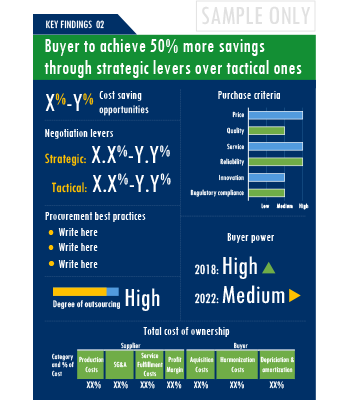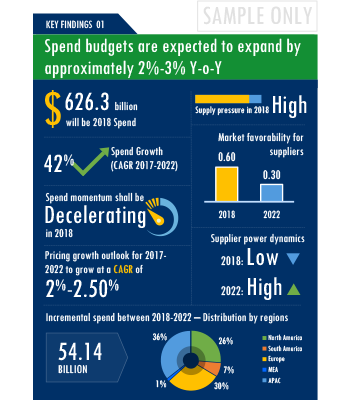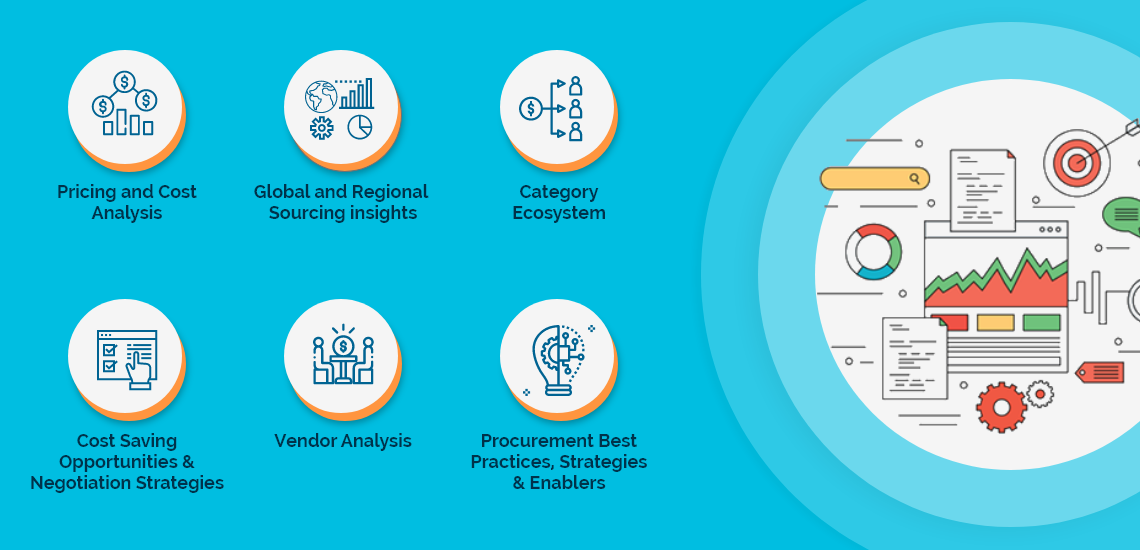The report provides a comprehensive coverage on Wheel-Balancing Equipment category spend growth and regional spend segmentation insights, Wheel-Balancing Equipment price trends and Wheel-Balancing Equipment supply market analysis.
GET FREE SAMPLEBusiness practices within Wheel-Balancing Equipment market are heavily influenced by changing trends across the category as well as within the broader Non-Military Vehicles market. Regulatory guidance on data protection and increasing concern over cybersecurity have increased the costs for suppliers as they incur additional spend on compliance and security. These additional costs have a potential to drive marginal increase in prices across the key geographies.
Several structural changes including M&As and vertical integration efforts of suppliers are characterizing the broader market. Such strategic developments can erode the strength of previously established supplier relationships due to changed realities in the supplier's ecosystem. At the same time, buyers may also find opportunities to onboard new suppliers with a wider range of offerings or better contract terms for
The report discusses in detail the best practices that have served well the category managers responsible for Wheel-Balancing Equipment procurement. For example, Strong R&D focus is the sign of a supplier committed to enhancing the quality and cost proposition of its solutions. Buyers should collaborate with such suppliers for development of low-cost but highly efficiency products that can bring their OPEX down. Buyers should invest in benchmarking studies that help category managers to improve their knowledge on market pricing or billing rates of service providers. This helps them to not only save costs but also increase their negotiation power. Buyers should engage with suppliers that repurchase used products at fair market value. This assists buyers to dispose of used products in a convenient manner. Also, during such repurchases, suppliers provide credits to buyers for future purchases. This reduces overall procurement costs for buyers.
Activate your free account to gain easy access to cutting edge research and insights on consumers, emerging price trends, global and regional suppliers.
Wheel-Balancing Equipment procurement managers also need to proactively identify and mitigate potential risks that can arise in the supply chain or contracts for Wheel-Balancing Equipment procurement. Some examples include:
For detailed insights and complete access to our report library, activate your free account!
The report is intended to serve as a one-stop reference guide for Wheel-Balancing Equipment procurement strategy and offers a perfect blend of category basics with deep-dive category data and insights. Therefore, it is ideal for category beginners looking for “Wheel-Balancing Equipment: Procurement Report 101” as well as for category experts actively tracking the global Wheel-Balancing Equipment procurement market.
You may have just initiated your research to design a winning Wheel-Balancing Equipment procurement strategy, or you may be a category expert looking for strategic insights and updated data.Either ways, the report has your requirements covered.

Unlock SpendEdge's comprehensive procurement report collection with ease through our procurement platform.
Procurement decisions can prove to be costly in the absence of careful deliberation and evaluation of every available option. In fact, more than 90% of the decision makers we work with acknowledge that timely availability of up-to-date category intelligence can help them make better purchasing decisions. More than 80% of them believe that in-house category intelligence needs to be updated periodically to achieve full benefits. If you have read so far, we are quite sure you agree!!
The Wheel-Balancing Equipment procurement report helps take more informed decisions by placing all the critical information and advice at the fingertips of a decision maker. It also specifically answers some of the key questions that we have been routinely asked during our industry outreach initiatives:
SpendEdge Insights has helped procurement professionals and sourcing teams manage multiple spend areas and achieve more than $2 billion in savings. Activate your free account today!
The Wheel-Balancing Equipment market report offers a complete picture of the supply market and analyzes the category from the perspective of both buyers and suppliers. Analysis of the category trends, procurement best practices, negotiation levers and overall category management strategy advisory are interspersed with in-depth data and commentary on spend outlook, pricing ecosystem and supplier landscape drilled down to a region-level coverage.

A key highlight of this report is the in-depth outlook created on Wheel-Balancing Equipment procurement spend and pricing trends. The report further delves deep into the aspects of cost structure, total cost of ownership and supplier margins for Wheel-Balancing Equipment. A dedicated section to supplier profiles and evaluation helps decision makers cast a wider procurement net and identify gaps in existing relationships.

Along with specific category and supplier intelligence, the publication also includes curated insights on Wheel-Balancing Equipment market trends, price influencers and inherent risks. These insights help the decision makers prepare for market shaping trends in advance and create alternative strategies for changes in the market conditions.

Additionally, the report also advises on the best practices and strategies to manage the Wheel-Balancing Equipment category efficiently. Negotiation levers and opportunities are explained in detail along with quantification of their potential. Benchmark KPIs for supplier and buyer performance management are also aggregated to better organize the category objectives. Other themes of advisory include ideal procurement organization structure, enablers to achieve KPIs or category objectives and ideal SLAs to have with suppliers.






Our research is complex, but our reports are easy to digest. Quantitative analysis and exhaustive commentary is placed in an easy to read format that gives you an in-depth knowledge on the category without spending hours to figure out “what does it mean for my company?”


SpendEdge presents a detailed picture of Wheel-Balancing Equipment procurement solutions by way of study, synthesis, and summation of data from multiple sources. The analysts have presented the various facets of the market with a particular focus on identifying the key category influencers. The data thus presented is comprehensive, reliable, and the result of extensive research, both primary and secondary.

Global Tyres For Motor Cars Market - Procurement Intelligence Report

Global Automobile Smog Control Devices Market - Procurement Intelligence Report

Global Automotive stampings Market - Procurement Intelligence Report

Global Automotive lamps Market - Procurement Intelligence Report

Global Fuel Economizers Market - Procurement Intelligence Report

Global Alcohol Ignition Lock Market - Procurement Intelligence Report

Global Seat Belts Market - Procurement Intelligence Report

Global Electric Steering Market - Procurement Intelligence Report

Global Silencers Market - Procurement Intelligence Report
Access this report and our entire procurement platform | Plans starting from USD 3000/ Year Buy Now
Copyright © 2026 Infiniti Research Limited. All Rights Reserved. Privacy Notice – Terms of Use – Sales and Subscription
Cookie Policy
The Site uses cookies to record users' preferences in relation to the functionality of accessibility. We, our Affiliates, and our Vendors may store and access cookies on a device, and process personal data including unique identifiers sent by a device, to personalise content, tailor, and report on advertising and to analyse our traffic. By clicking “I’m fine with this”, you are allowing the use of these cookies. You may change your settings based on a legitimate interest at any time, by selecting “Manage Settings” on our site. Please refer to the help guide of your browser for further information on cookies, including how to disable them. Review our Privacy & Cookie Notice.
